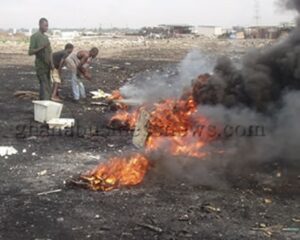E-waste in Ghana – How many children are dying from lead poisoning?
 News this week about over hundred people including children dying from lead poisoning in Zamfara State in Nigeria raises lots of concern, and must sound the warning alarm for Ghana in the light of the e-waste dumping that goes on in the country.
News this week about over hundred people including children dying from lead poisoning in Zamfara State in Nigeria raises lots of concern, and must sound the warning alarm for Ghana in the light of the e-waste dumping that goes on in the country.
According to the BBC some 163 people have died from lead poisoning and there are fears that many more are likely to die. The deaths occurred after local people started digging for gold in areas high in concentrations of lead.
Ghana has been identified as a dumping ground for electronics waste or e-waste from the UK, the USA and other European countries. Evidence uncovered by both local and international media including organizations like the Greenpeace shows that the West’s e-waste is being dumped in Ghana.
E-waste is known to contain a cocktail of poisonous chemicals that are released into the atmosphere and underground water and these chemicals contain substances like lead, mercury and arsenic.
Indeed, apart from e-waste that is brought in from outside the country, e-waste is also generated locally. Most Ghanaians have no idea what to do with their obsolete mobile phones, TV sets, sound systems, refrigerators and computers. Some simply dump these at repair shops and others onto waste dumps.
On a trip around some of Accra’s electronics items shops, one sees large numbers of obviously outmoded and unusable electronics items in store.
Lack of a national policy and or national collection points for such items make local generation of e-waste another source of concern. But what should be more worrying is the news from Nigeria that people are dying from lead poisoning.
It is not known yet if a conclusive study has been carried out in Ghana regarding lead poisoning from e-waste. But information available says some samples have been taken from some young people who work at the Agbogbogbloshie dump dismantling old electronics items and burning the cables to extract the copper for testing.
The Greenpeace had done a lab test of the soil and water at Agbogbloshie from where electronics items are dismantled and the cables put on fire to remove the copper wires. The results of the Greenpeace test showed that the soil in the area contained toxic chemicals at levels a hundred times more than allowable limits.
With these evidences, it is clear that Ghanaians are exposed to a great deal of chemical dangers from e-waste, but it appears there are no proactive efforts to stem the tide before the situation gets out of hand.
If Ghanaians are unaware of the dangers posed to human health and life, the news from Nigeria should be enough to wake the country up to the time bomb we are sitting on as unknown numbers of Ghanaians could be dying from chemical poisoning from e-waste.
In a recent email communication with the UK’s Environment Agency (EA), an official told ghanabusinessnews.com that they have concluded investigations into allegations that some recycling companies in the UK contracted to recycle e-waste have been dumping these into Ghana. The EA said they have handed the findings to their lawyers.
By Emmanuel K. Dogbevi
